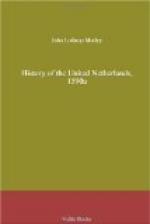In the Netherlands there was no king, and strictly speaking no people. But this latter and fatal defect was not visible in the period of danger and of contest. The native magistrates of that age were singularly pure, upright, and patriotic. Of this there is no question whatever. And the people acquiesced cheerfully in their authority, not claiming a larger representation than such as they virtually possessed in the multiple power exercised over them, by men moving daily among them, often of modest fortunes and of simple lives. Two generations later, and in the wilderness of Massachusetts, the early American colonists voluntarily placed in the hands of their magistrates, few in number, unlimited control of all the functions of government, and there was hardly an instance known of an impure exercise of authority. Yet out of that simple kernel grew the least limited and most powerful democracy ever known.
In the later days of Netherland history a different result became visible, and with it came the ruin of the State. The governing class, of burgher origin, gradually separated itself from the rest of the citizens, withdrew from commercial pursuits, lived on hereditary fortunes in the exercise of functions which were likewise virtually hereditary, and so became an oligarchy. This result, together with the physical causes already indicated, made the downfall of the commonwealth probable whenever it should be attacked by an overwhelming force from without.
The States-General, however, at this epoch—although they had in a manner usurped the sovereignty, which in the absence of a feudal lord really belonged to the whole people, and had silently repossessed themselves of those executive functions which they had themselves conferred upon the state council—were at any rate without self-seeking ambition. The Hollanders, as a race, were not office seekers, but were singularly docile to constituted authority, while their regents—as the municipal magistrates were commonly called—were not very far removed above the mass by birth or habitual occupation. The republic was a social and political fact, against which there was no violent antagonism either of laws or manners, and the people, although not technically existing, in reality was all in all. In Netherland story the People is ever the true hero. It was an almost unnoticed but significant revolution—that by which the state council was now virtually deprived of its authority. During Leicester’s rule it had been a most important college of administration. Since his resignation it had been entrusted by the States-General with high executive functions, especially in war matters. It was an assembly of learned counsellors appointed from the various provinces for wisdom and experience, usually about eighteen in number, and sworn in all things to be faithful to the whole republic. The allegiance of all was rendered to the nation. Each individual member was required to “forswear his native province in order to be true to the generality.” They deliberated in common for the general good, and were not hampered by instructions from the provincial diets, nor compelled to refer to those diets for decision when important questions were at issue. It was an independent executive committee for the whole republic.




